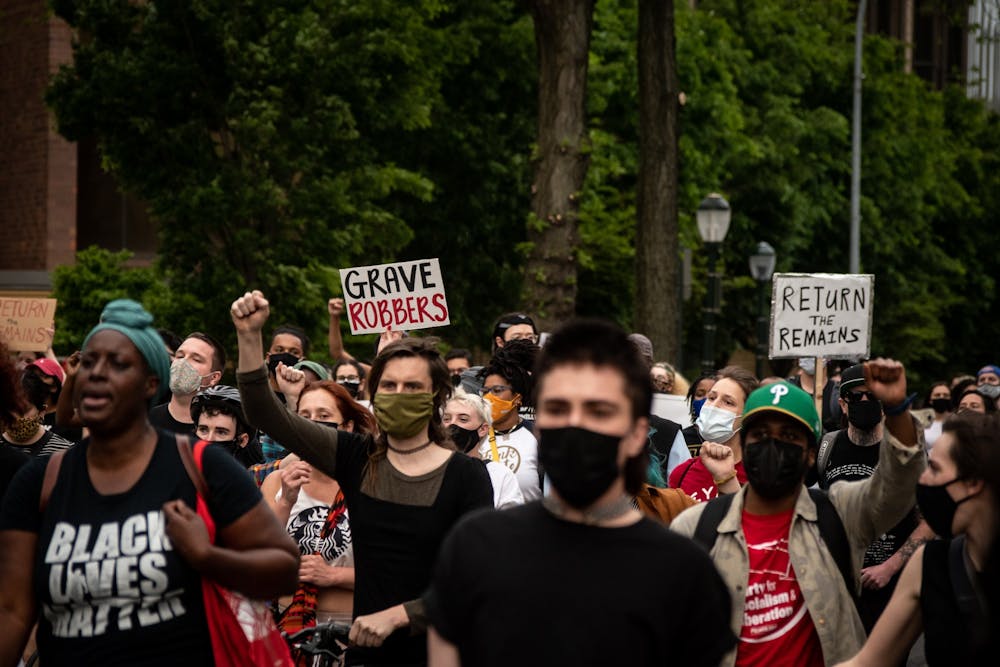
A Penn-commissioned investigation into the handling of human remains from the 1985 MOVE bombing concluded that two Penn professors demonstrated "extremely poor judgment and gross insensitivity" for retaining the remains for decades and using them for an online Princeton University course.
Released months after widespread demands and protests, the investigation report, authored by The Tucker Law Group, stated that the professors did not violate any legal or ethical standards in their conduct. The report offered a number of recommendations to the Penn Museum — some of which the Museum is already working on — including hiring a chief diversity officer and conducting a review of the Museum's collection practices. The remains were ultimately returned to the Africa family on July 2.
In 1985, the Philadelphia city government bombed a home on Osage Avenue that housed MOVE, a Black liberation advocacy group, killing 11 people, including five children aged seven to 13.
Now-retired Penn professor Alan Mann first received the remains in 1985 after the Philadelphia Medical Examiner’s Office asked for assistance in identifying them. Mann later studied the remains with Janet Monge, curator-in-charge of the Penn Museum's physical anthropology section. The remains, a pelvic bone and a femur, were transferred back and forth between Penn and Princeton for over 35 years.
The professors came under fierce condemnation and faced demands and protests in April for the remains to be returned to the Africa family. The Africa family believed the remains to be those of children Tree and Delisha Africa — but the report notes that there is no credible evidence that Mann took the remains concluded to be those of Delisha. Mann and Monge also did not believe that the remains they brought to the Museum could be conclusively identified as those of Tree.
The Museum and University administrators previously offered two apologies and committed to a comprehensive review of their handling of the remains.
The Aug. 25 report condemned Mann's possession of the remains from 1985 to 2001 for "gross insensitivity to the human dignity as well as the social and political implications of his conduct." The report notes that Mann made no effort to return the remains to the Philadelphia Medical Examiner's Office or contact any MOVE member from while he possessed the remains, which he kept stored in his office.
The report similarly condemned Monge for retaining the remains from 2001 to 2021 and for using them in the online Princeton course, "Real Bones: Adventures in Forensic Anthropology," without the Africa family's consent. Monge stored the remains in a file cabinet from 2001 to 2014 and in her lab at the Museum from 2014 to 2021. She showed the remains to graduate students, donors, and Museum personnel on at least 10 occasions between 2014 and 2019, the report states.
Monge attempted to contact two members of the MOVE family in 1995 and 2014 — once through a third-party intermediary — to identify and return the remains, but the family declined to help her, the report states.
The report recommended that the Museum hire a chief diversity officer; create a full-time position for a bio-anthropologist or archaeologist with a record of advocacy for Black and Indigenous people, who has expertise with repatriating and analyzing human remains; and conduct a comprehensive review of the Museum's holdings and collection practices for human remains — all three of which the Museum is currently working on.
Further recommendations include the formation of a University-funded committee to advise the University on the report's recommendations and its ongoing relationship with the West Philadelphia community, the permanent installation on the MOVE bombing at a publicly accessible location at Penn, the creation of a joint exhibition with the African American Museum in Philadelphia on the role of university scholars in the development of scientific racism, and the creation of a scholarship program for students from Philadelphia high schools.
The report stated that the controversy surrounding the MOVE remains was aided by numerous inaccuracies — including the beliefs that the remains used in Monge's course were indisputably those of Tree Africa, that the remains of Delisha Africa were housed at the Museum, and that no effort was ever made to return the remains to the Africa family.
The report noted that the identity of the remains Mann took to the Museum is a matter of legitimate dispute, and The Tucker Law Group could only conclude that the remains used in Monge's 2019 course video were of a MOVE member. The report further added that there is no concrete evidence that Delisha's remains were ever housed at the Museum, and several efforts were made to return the MOVE remains.
The Tucker Law Group interviewed more than 40 people, including members of MOVE; current and former Museum employees; Penn faculty, students, and alumni; elected officials; anthropologists; and community members to inform the report. They also reviewed archival records, the 1986 MOVE Commission Report, the 1988 MOVE Grand Jury Report, police records, records from the Philadelphia Medical Examiner's Office, codes of ethics from professional organizations, and Pennsylvania and New Jersey state law.
“This has been a deeply painful experience, most importantly for the Africa Family, and for all of us who are part of a city scarred by a history of violence and racism,” Williams Director of the Penn Museum Christopher Woods said in a press release. “And while the investigation concluded that there was no violation of legal and ethical policies, it’s clear that human dignity was not prioritized across historical institutional practices.”
The Daily Pennsylvanian is an independent, student-run newspaper. Please consider making a donation to support the coverage that shapes the University. Your generosity ensures a future of strong journalism at Penn.
Donate



